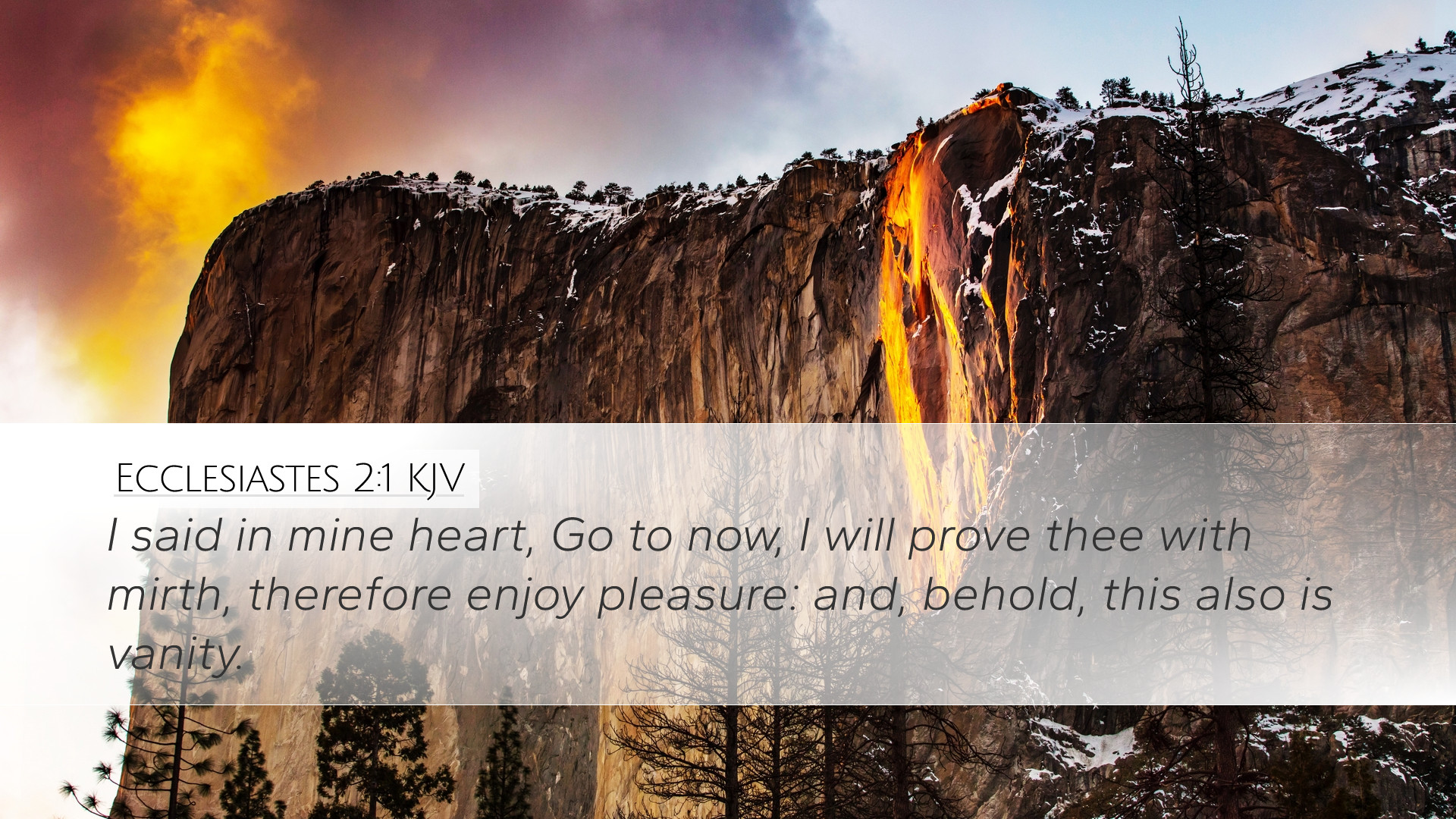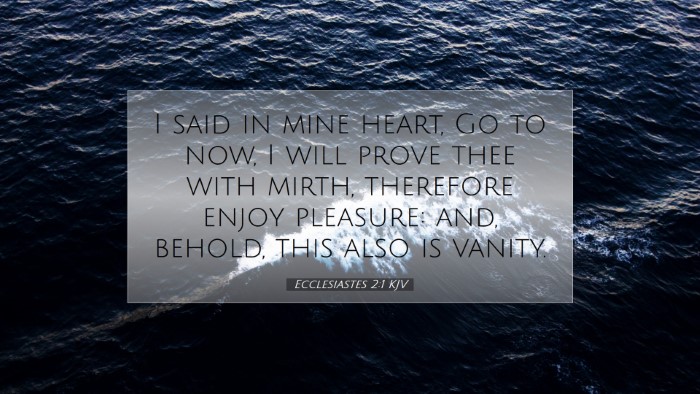Commentary on Ecclesiastes 2:1
Ecclesiastes 2:1: "I said in mine heart, Go to now, I will prove thee with mirth, therefore enjoy pleasure: and, behold, this also is vanity."
Contextual Overview
Ecclesiastes, traditionally attributed to Solomon, is a meditation on the meaning of life and the pursuit of happiness. In Chapter 2, the Preacher engages in a personal exploration of pleasure and its ultimate worth. This passage introduces a pivotal theme of the book: the seeming futility of human endeavors in the quest for meaning.
Insights from Public Domain Commentaries
Matthew Henry's Commentary
According to Matthew Henry, the Preacher acknowledges the pursuit of joy through pleasures, stating, "I will prove thee with mirth." This reveals an introspective approach where he deliberately seeks out happiness through hedonistic experiences but quickly notes that these pursuits are 'vanity.' In his assessment, Henry sees a significant aspect of human existence: the relentless search for fulfillment in worldly pleasures that ultimately fail to provide lasting satisfaction.
Henry emphasizes the idea that mirth is temporary and appears meaningless without a divine foundation. There is an inherent emptiness in life when pleasures are separated from a relationship with God, a theme that resonates throughout the book of Ecclesiastes. The Preacher's admission also serves as a warning that indulgence, when disconnected from spiritual insight, can lead to disillusionment.
Albert Barnes' Notes on the Bible
Albert Barnes provides a nuanced understanding of the phrase "I said in mine heart." He notes that this introspection is a critical component of the spiritual journey, emphasizing the need to assess one's motives and pursuits deeply. He argues that the fleeting nature of pleasure and the eventual recognition of vanity represents a universal human experience—echoing the Biblical wisdom that the heart can often lead one astray in the pursuit of ephemeral joys.
Barnes highlights that the Preacher does not dismiss pleasure outright; rather, he examines it critically. In his exploration, he embodies a seeker of truth who tests the limits of earthly delights, which ultimately leads him to a sobering conclusion. This commentary stresses the importance of balance and warns against allowing pleasure to become an end in itself.
Adam Clarke's Commentary
Adam Clarke adds a rich layer of analysis to this verse by commenting on the idea of 'proving.' He explains that the act of proving oneself through pleasure is a venture fraught with risks and pitfalls. Clarke underlines that the Preacher's declaration to "enjoy pleasure" is not naive but rather a calculated choice to understand the depths of humanity’s quest for joy. Yet, he is quick to affirm that even in enjoyment, one must be cautious of the vanity woven into pleasure-seeking.
Clark’s interpretation acknowledges the paradox of enjoying life while maintaining awareness of its fleeting nature. He urges readers to recognize that while pleasure itself is not inherently evil, the absence of a higher purpose leads to a lack of fulfillment. Clarke's insights remind scholars and theologians alike of the importance of integrating spirituality into the experience of pleasure.
Theological Implications
The exploration of pleasure as depicted in Ecclesiastes 2:1 raises profound theological questions about the nature of fulfillment and the quality of joy. The observations made byHenry, Barnes, and Clarke collectively remind us that human happiness cannot be solely determined by material or transient experiences. Rather, lasting joy is found in a relationship with God, leading us to consider the ultimate purpose of our endeavors.
This verse serves as a theological checkpoint. For pastors and students of scripture, it challenges believers to reflect on their own pursuits of pleasure—are they seeking fulfillment in transient joy, or are they aligned with a higher calling? The essence of Ecclesiastes beckons readers to discern the 'vanity' in their quests and to be introspective about the true sources of contentment.
Practical Applications
Drawing from these commentaries, several practical applications arise from Ecclesiastes 2:1 for both personal and communal spiritual growth:
- Self-Examination: Individuals are encouraged to pause and reflect on their life choices. Are pursuits driven by a desire for pleasure overshadowing the search for deeper meaning?
- Integration of Joy and Spirituality: Churches and ministries should foster environments where joy is celebrated in tandem with worship, enhancing the understanding that true pleasure is intertwined with divine purpose.
- Teaching on Vanity: Pastoral teachings can incorporate the insights from Ecclesiastes to warn congregants against the allure of a pleasure-seeking lifestyle that neglects spiritual health.
- Community Accountability: Establishing small groups focused on discussing life’s pursuits in light of scripture encourages shared wisdom and accountability in navigating the complexities of joy and fulfillment.
Conclusion
Ecclesiastes 2:1 is a powerful reminder of the tension between human desire for pleasure and the sobering recognition of its limitations. The insights from Matthew Henry, Albert Barnes, and Adam Clarke not only deepen our understanding of this exquisite passage but also invite us into a reflective journey about our pursuit of happiness. For pastors, students, and theologians, this verse stands as a beacon urging an exploration of worldly pleasure through a lens rooted in our relationship with God, ultimately guiding us toward a more profound spiritual fulfillment.


